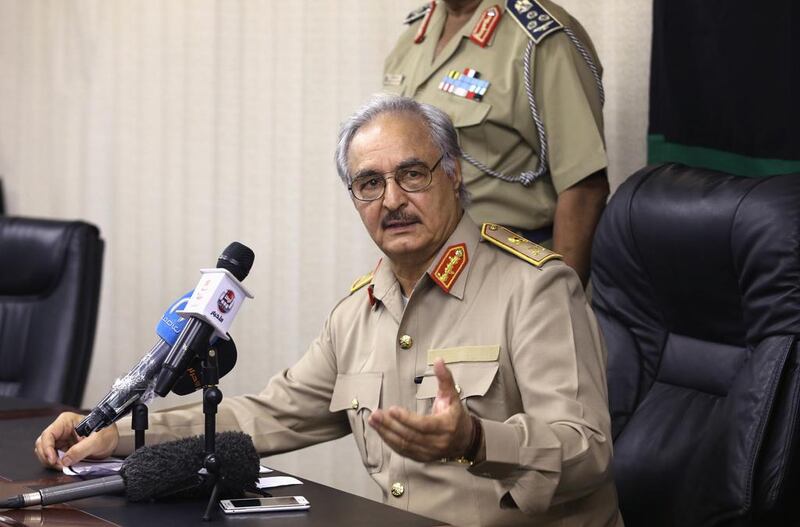Paris // The capture of Libya’s key oil ports by powerful eastern military commander General Khalifa Haftar are the first shots in what may be a protracted and bitter civil war for control of the country’s rich natural resources.
Gen Haftar, commander of the army of the national parliament in Tobruk, launched simultaneous attacks on Sunday morning by four armoured columns on ports held by the Petrolium Facilities Guard (PFG), a militia aligned to the rival, United-Nations backed Government of National Accord (GNA) in Tripoli.
Within hours Gen Haftar’s forces had captured El Sidra, Libya’s largest export port, and Ras Lanuf, its principal refinery. On Monday, the troops captured a third oil port, Zueitina and fighting continued for a fourth, Brega.
The operation, named Al Barq Al Khatif, or Sudden Lightning, caught many by surprise, both in its speed and the numbers of troops involved.
Units of Gen Haftar’s Libyan National Army are simultaneously fighting against militias, including ISIL units, in Benghazi, yet were able to deploy sufficient numbers for the four attacks, along with a separate offensive to capture Ajdabiya, a key base for Petroleum Facilities Guard units.
El Sidra and Ras Lanuf had been captured without a battle, said Akram Buhliga, a Libyan National Army spokesman. “The PFG withdrew without any drop of blood or fighting,” he told the Libya Channel TV station.
In Tripoli, the GNA was caught off guard, its prime minister Fayez Al Serraj away on holiday. He rushed back to the capital, delivering a terse statement on Monday declaring the oil ports belonged to his government alone.
For the United Nations, the attack is a blow to its efforts to persuade Gen Haftar, and the Tobruk parliament, to accept the GNA as Libya’s sole government.
Martin Kobler, chief of the United Nations Support Mission in Libya tweeted: “Worried about reported fighting in the oil crescent. Will add to division and further restricting oil exports. Oil belongs to all Libyans.”
While Gen Haftar’s offensive, and its daring scope, was unexpected, the struggle for Libya’s oil has been boiling for months.
Tobruk’s parliament has yet to accept the GNA government in Tripoli, last month voting against a proposed cabinet put forward by Mr Al Serraj.
In April, Tobruk attempted to independently export 660,000 barrels of oil in an Indian-registered tanker but the move was blocked by the UN sanctions committee which declared that only the GNA could sell Libya’s oil.
On July 3, diplomats were encouraged when the Tripoli and Tobruk versions of the National Oil Corporation, until then bitter rivals, agreed to join forces, with Mustafa Sanallah, a highly respected oil expert, becoming chairman.
On July 23, the leader of the Petroleum Facilities Guard, Ibrahim Jadhran, reached an agreement with the GNA to reopen the oil ports, which had been closed for more than two years.
However, Mr Sanallah complained that the deal set a “terrible precedent” and that it would encourage other militias to make similar demands.
The ports have been closed since they were attacked and damaged by the Libya Dawn militias in December 2014, with further damage inflicted and storage tanks destroyed by ISIL in February this year.
Mr Jadhran’s support for the GNA has meanwhile provoked tension with Tobruk. On August 5 one of Gen Haftar’s battalions moved to within a few kilometres of Zueitina oil terminal, threatening to seize it.
Tensions appeared to be defused after a statement on August 10 from the United States, France, Italy, Spain and the United Kingdom demanding all ports must be controlled by “legitimate national authorities” – in other words, the GNA.
However, Mr Buhliga made clear that the Libyan National Army was by then preparing its offensive, saying it “had been planned for months. Today we witnessed zero hour.”
As things stand, the GNA is the only Libya government allowed by the UN to sell Libyan oil, but most of that oil, in Libya’s “oil crescent”, is now controlled by Gen Haftar and the Tobruk parliament, which is backed by Arab countries including Egypt, Jordan and the UAE. France also declared in July that its special forces are helping Gen Haftar in battles against Islamist militants.
The Libyan National Army has announced its intention to reopen the oil ports, which could see production increase. Before the fall of Muammar Qaddafi in 2011, the country exported 1.6 million barrels a day, but chaos and civil war has reduced that figure to between 300,000 and 200,000 barrels per day now.
However, it is likely the Tobruk parliament will demand a new revenue-sharing deal with the GNA, in exchange for allowing the oil to flow. The GNA now faces a difficult decision on whether to negotiate a compromise or launch an attack to retake the ports, risking further casualties and damage to the facilities.
foreign.desk@thenational.ae





